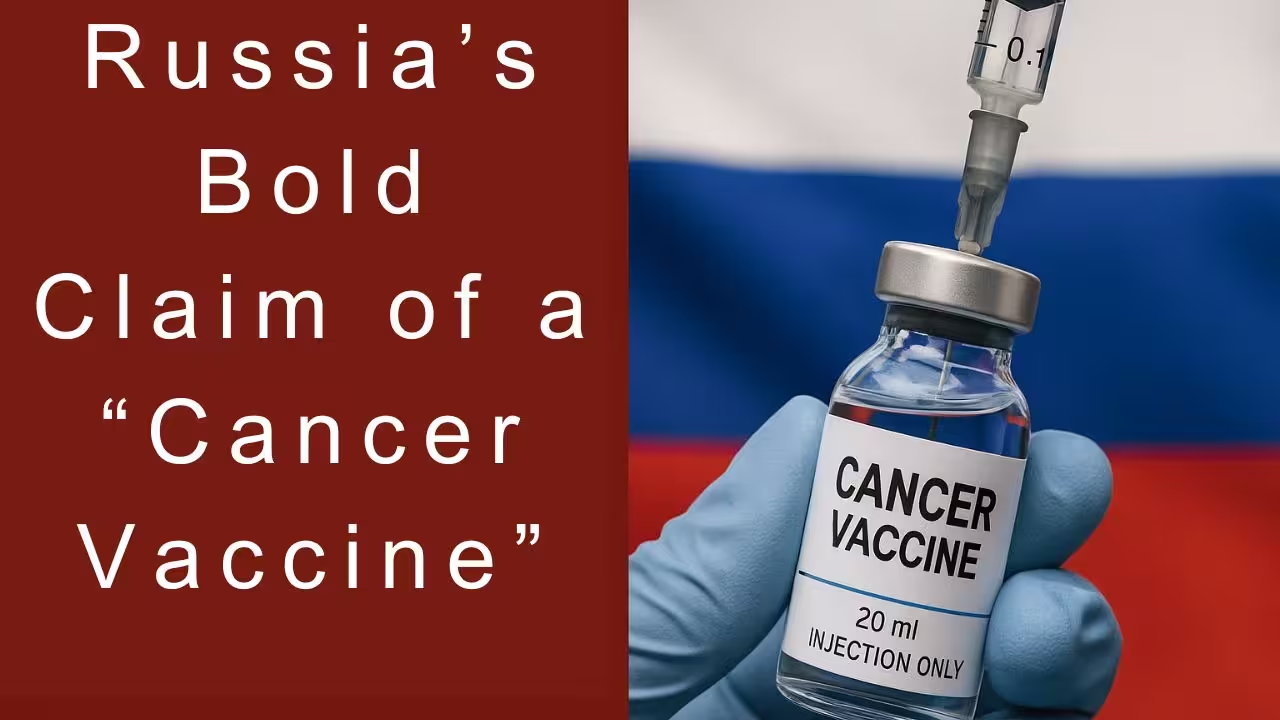Physical Address
304 North Cardinal St.
Dorchester Center, MA 02124
Physical Address
304 North Cardinal St.
Dorchester Center, MA 02124

In early September 2025, Russian state media headlines declared a historic breakthrough: the world’s first “cancer vaccine” with 100% efficacy, developed by the country’s Federal Medical-Biological Agency (FMBA). The announcement, made at the Eastern Economic Forum in Vladivostok, promised that patients in Russia could soon access a treatment that not only slows tumor growth but could potentially eradicate cancer altogether. Yet, beyond the headlines, the picture is far more complex. Here’s a comprehensive look at what is known, what remains uncertain, and why global experts are cautious.
The most advanced Russian program is called EnteroMix, developed at the National Medical Research Radiological Center (NMRRC). According to official sources, EnteroMix is a therapeutic cancer vaccine designed for colorectal cancer and is built from a cocktail of four non-pathogenic viruses. These viruses are engineered to preferentially infect and destroy tumor cells while triggering a broader immune response.
While many international outlets described EnteroMix as an “mRNA vaccine,” this is a mistake. The NMRRC’s own documentation clarifies that EnteroMix belongs to the oncolytic virus family, not mRNA. The confusion stems from the fact that Russia is also pursuing a separate mRNA-based personalized cancer vaccine program (see below).
Oncolytic viruses like EnteroMix are not a new concept in oncology. They operate on two levels:
This dual mechanism has been successfully demonstrated in other global therapies such as T-VEC, an FDA-approved oncolytic virus for melanoma. EnteroMix, therefore, is scientifically plausible, but its own efficacy must be proven through human trials.
Read Also: What’s New in ChatGPT-5? A Complete Comparison With Older Versions
Russian officials, led by FMBA chief Veronika Skvortsova, reported that EnteroMix achieved “100% efficacy” in preclinical trials. According to her statement, the vaccine not only slowed tumor growth but, in some cases, caused significant tumor shrinkage.
However, the critical distinction here is that these results were presented from preclinical and very early clinical testing, not large-scale human trials. No peer-reviewed papers detailing the methods, sample size, or outcome measures have been published. Media reports citing “100% success” should therefore be treated with caution until independent validation appears.
Despite headlines about readiness, EnteroMix is not yet approved by the Russian Ministry of Health. Official statements indicate that it is “ready for use” pending approval. Some reports even suggested the vaccine would be provided free to patients after approval, but without a published label, approval order, or treatment guidelines, these remain promises rather than policies.
Until approval is granted, EnteroMix would only be accessible through clinical trials or special compassionate-use programs. As of now, no public trial registry entry with full protocol details has been disclosed.
While EnteroMix has attracted the most attention, the Gamaleya National Research Center, famous for developing the Sputnik V COVID-19 vaccine, is simultaneously working on a personalized mRNA cancer vaccine. This program focuses first on melanoma, with reports suggesting pilot human use could begin in late 2025.
Unlike EnteroMix’s viral strategy, the Gamaleya vaccine relies on tumor sequencing and AI-driven neoantigen prediction. The resulting mRNA vaccine would be manufactured for each patient, training their immune system to recognize tumor-specific mutations.
Again, no peer-reviewed clinical results have been released, and the logistical challenges of personalization—such as manufacturing speed and cost—remain unaddressed in Russian disclosures.
FMBA statements claim that EnteroMix has shown “very low toxicity” and is “well tolerated” in studies. Some reports reference a Phase I trial with 48 volunteers, but details on adverse events, dosing schedules, and long-term safety have not been published in scientific literature. For the mRNA line, no human data exist yet.
In short, while Russian authorities emphasize safety, independent safety data remain unavailable.
This is not Russia’s first foray into cancer vaccine territory. In 2008, Russia approved Oncophage (vitespen), a personalized vaccine derived from patients’ own tumor heat-shock proteins, for intermediate-risk kidney cancer. At the time, it was hailed as the world’s first approved therapeutic cancer vaccine. However, Oncophage was never approved in the U.S. or Europe due to limited efficacy in large trials. It serves as a reminder that regulatory approval alone does not guarantee international acceptance or clinical success.
Globally, cancer vaccines are one of the hottest frontiers in oncology research. Companies like Moderna, BioNTech, and Merck are running Phase II and III trials of personalized mRNA vaccines, particularly for melanoma and other solid tumors. Results so far are promising, with improved relapse-free survival in early studies.
EnteroMix and the Gamaleya mRNA line align Russia with this global push. However, while Western programs are already publishing peer-reviewed Phase II data, Russia’s claims are still at the stage of government briefings and press releases.
To move beyond hype, several milestones are necessary:
Until then, Russia’s “cancer vaccine” remains a program with enormous potential but unverified real-world efficacy.
Russia’s announcement of a “cancer vaccine” marks a bold step in the global race for new oncology solutions. EnteroMix, the viral therapy, and Gamaleya’s upcoming personalized mRNA vaccine represent two scientifically valid approaches. Yet, history cautions us against mistaking political declarations and early laboratory results for medical reality. Patients and doctors worldwide will need peer-reviewed data, transparent clinical trial results, and regulatory clarity before these therapies can truly reshape cancer treatment.
Read Also: Pitru Paksha 2025: When Does It Start, Significance, and Rituals